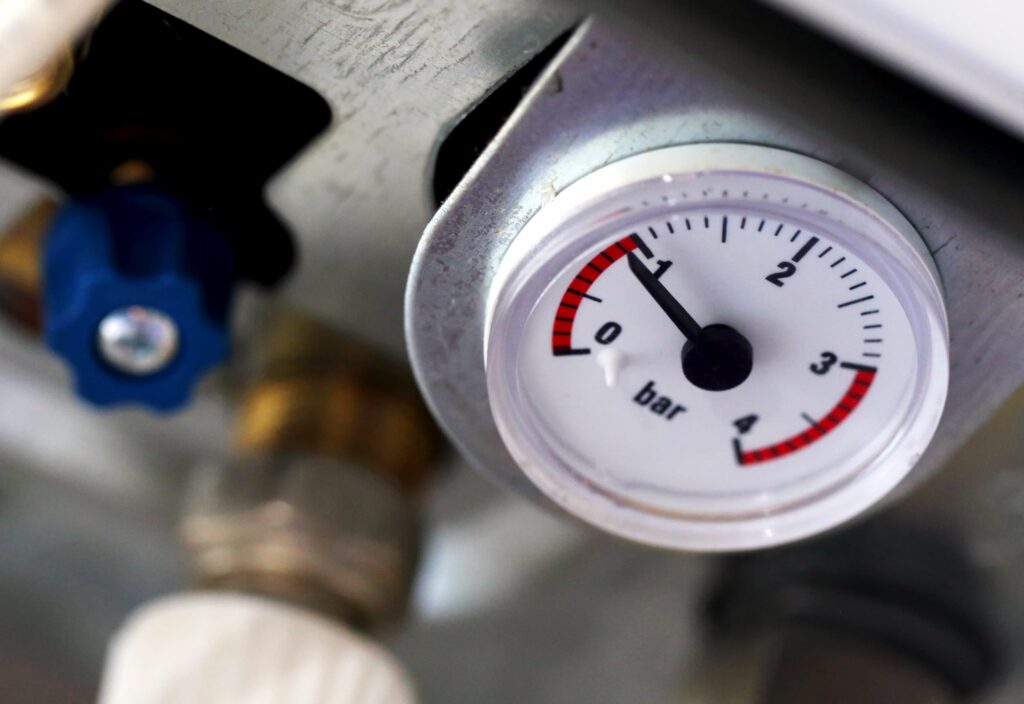Low boiler pressure can have a big impact on your heating system, leading to no hot water, no central heating and, in the case of gas stoves, impaired cooking facilities. In the summer months, this might not cause an urgent panic, but in winter it can have a much bigger impact on your living quality.
In some cases, fixing the issue is as simple as increasing your boiler pressure after an expected drop. However, if you weren’t expecting your boiler pressure to drop – and worse, if it keeps dropping after being repressurised – that could be a sign of a more serious problem.
What pressure should my boiler be?
Knowing what’s normal in terms of boiler pressure can be a great first step to spotting common boiler problems. However, it’s important to be aware that the ideal boiler pressure isn’t static – it changes depending on whether or not you’re using your boiler at the time of reading.
You should be able to find your boiler’s pressure reading on a small dial on the front of your boiler unit – similar to the one shown in the image above. Check your boiler’s manual for more information if you can’t find it. The dial should reach from 0 on the left to 4 bars on the right, and it may be colour-coded to help you spot major pressure issues.
When your boiler’s not in use – you’re not using the stove or hot water, and the central heating is off – your boiler pressure should be roughly 1 bar. Once you’re using the boiler for something, it’s normal for it to increase to around 2 bars.
Abnormal boiler pressure is when your boiler goes below 1 bar or reaches over 2.75 bars. This doesn’t necessarily mean there’s a costly fix on the horizon, but if you can’t fix the problem by either bleeding your radiators or repressurising the system (depending on whether your boiler pressure is too low or too high) then you may need to consult a Gas Safe registered engineer.
Why does my boiler pressure keep dropping?
As mentioned above, bleeding your radiators is one way to lower the pressure in your boiler if it’s too high. Sometimes, this can make it drop too low, which could be the cause of your low pressure issue. If that’s the case, just use the filling valve located on your boiler to raise the pressure to a safe level – check your boiler’s manual for details on how to do this with your particular make and model.
But if your boiler pressure keeps dropping when you haven’t bled your radiators, that’s a sign of a fault somewhere in the system. Below are the two main culprits…
Radiator leaks
Technically, a water leak within your central heating system could happen in any location, including on the pipes and fixings within your walls and under the floor. However, these pipes are less exposed to the kinds of environmental factors that might lead to corrosion.
It’s more likely that any leak will appear on an exposed area of pipe, such as those connecting your radiators to the rest of the system. This could happen if condensation forms on the pipes and is allowed to sit, leading to corrosion and, in time, the integrity of the pipe or fixing becoming compromised.
You might notice a radiator leak if a puddle or pool of water begins to form underneath your radiator, with no apparent cause. But be aware that this can be more difficult to spot on carpeted floors as the water is soaked up by the fibres – so if you notice unexplained low boiler pressure, it’s worth going around all your radiators and manually checking for damp areas.
If you find a radiator leak, don’t try to fix it yourself – it’s not worth the hassle or the damage you could accidentally do to the system. Contact a specialist plumber to repair the problem instead, and get them to have a look at your boiler while they’re at it, just in case there are any problems elsewhere.
Boiler leaks
If your low pressure problem isn’t caused by a leak on or around a radiator, chances are that it’s a boiler leak issue. These are trickier to spot because the leak is often located inside the boiler rather than on a nicely visible bit of pipe. However, you may still see a puddle forming underneath the boiler, so if you notice unexplained water in that area, it’s time to call a Gas Safe registered engineer to take a look.
Boiler leaks commonly come about as a result of a part or fixing within the boiler getting old and becoming faulty. This happens naturally with the wear and tear of using your boiler, but you can help to avoid problems caused by it by getting your boiler serviced regularly. This means that any potentially problematic components can be identified and repaired or replaced before they cause an issue.
If a boiler leak does seem to be the issue, it’s another problem you shouldn’t try to fix yourself. A Gas Safe registered engineer will take your boiler apart, find the issue and fix it in the safest and fastest way possible to avoid excessive disruption where possible.
Remember, although a boiler repair job might not be the expenditure you were hoping for, it’s much less costly than allowing a leak to spread or worsen and having to deal with the resultant water damage – all without your boiler in action.
Whatever’s causing your low boiler pressure, a Gas Safe engineer can help to resolve the problem and get your boiler running as it should again as safely and efficiently as possible. Get in touch today to book an inspection.



